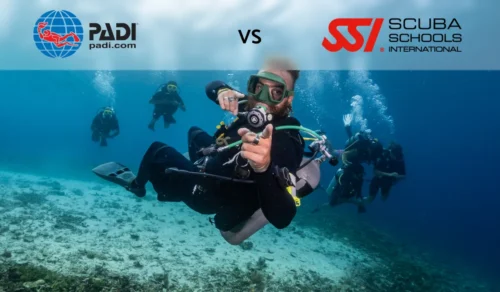Getting Scuba Certified (PADI/SSI): Costs, Requirements, and Choosing the Right Course
In our [Ultimate Scuba Diving Guide for Beginners], we established that getting certified is the first and most crucial step to exploring the ocean safely. But between PADI and SSI, which one should you choose? What does the course entail, and how much does it cost?
This article will answer all those questions, helping you confidently select the course that’s right for you.
Why Do You Need a Diving Certification?
A diving certification is more than just a card. It’s proof that you have been equipped with:
- Knowledge & Skills: You understand how your body reacts to the underwater environment, how to use equipment proficiently, and how to handle common situations.
- Safety: Proper training is the fundamental core of every safe dive.
- Confidence: Completing the course builds your confidence and comfort underwater, allowing you to fully enjoy the ocean’s beauty.
- Access to Exploration: Most dive operators worldwide require you to present a certification card before they will rent you tanks or let you join a dive trip.
PADI vs. SSI: Which Organization to Choose?

PADI (Professional Association of Diving Instructors) and SSI (Scuba Schools International) are the two largest and most respected dive training agencies in the world. The good news is that certifications from both are recognized and accepted globally.
So, what’s the difference?
The Key Takeaway: Instead of focusing on the PADI or SSI brand, focus on the quality of the Instructor and the Dive Center. A great teacher and a reputable center with small class sizes will provide a far better learning experience.
Details of the Open Water Diver Course
This is the most popular entry-level course. Whether you learn with PADI or SSI, your course will consist of three main parts, typically lasting 3-4 days:
- Knowledge Development: You’ll learn about dive physics, physiology, dive planning, and how the equipment works. Most centers now offer an e-learning option so you can study at home beforehand.
- Confined Water Dives: In a pool or calm bay, you’ll get comfortable with the gear and practice essential skills like breathing underwater, recovering your regulator, clearing your mask, and basic emergency procedures.
- Open Water Dives: This is the best part! You will complete 4 dives in the actual ocean. Here, you’ll apply your skills and begin exploring coral reefs and marine life under the close supervision of your instructor.
>>> Read More: Open Water Coures
Requirements to Join the Course
- Age: Minimum 10 years old (for a Junior Open Water Diver certification).
- Health: You must be in good physical health. Before the course, you will be asked to fill out a medical questionnaire. If you have any pre-existing conditions, a doctor’s clearance will be required. Learn more in our article: The Diver’s Medical Checklist
- Swimming Skills: You don’t need to be a competitive swimmer, but you must be able to swim 200m (or 300m with a mask and snorkel) and float/tread water for 10 minutes.
How Much Does Certification Cost?
In Vietnam, the cost for an Open Water Diver course typically ranges from $380 to $650 USD (9,000,000 to 15,000,000 VND), depending on the location and dive center.
An all-inclusive course package usually includes:
- Instructor fees.
- Rental of all scuba equipment.
- Certification fee (physical and/or digital card).
- Boat trips to the dive sites.
- Lunch and drinking water on the boat.
Always ask what is not included, such as: e-learning material fees, national park entrance fees (like in Con Dao), underwater photos, etc.
Golden Advice From Amadive: Choosing a Reputable Dive Center
- Prioritize Small Groups: Ask about the maximum student-to-instructor ratio. At Amadive, we focus on small groups of only 2-4 students to ensure maximum attention and safety.
- Check Reviews: Read reviews on Google and TripAdvisor to see what past students have experienced.
- Don’t Choose the Cheapest Option: Your safety is priceless. An unusually low price might mean corners are being cut on equipment quality or staffing.
- Talk to the Dive Center: A professional center will always be happy to answer all your questions clearly and transparently.
Earning your Open Water Diver certification is like getting a passport to explore the other 70% of our planet. It is an investment in a lifetime of unforgettable experiences.
Dive Safety & Truly Experience Diving in Con Dao with Amadive!
🌐 Website: www.amadive.com.vn
📲 WhatsApp: +84392419241
📧 Email Reservation: book.amadive@gmail.com
